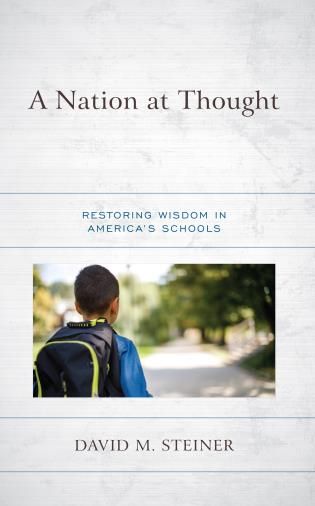Education
The Dysfunction of American Schools and How to Restore Them
A conversation with David Steiner, the author of “A Nation at Thought.”
Posted April 8, 2024 Reviewed by Monica Vilhauer
What if the quality of the education your child receives largely comes down to luck? This is an idea proposed by Dr. David Steiner, Executive Director of the Johns Hopkins Institute for Education Policy, in his new book A Nation at Thought: Restoring Wisdom in America’s Schools. David blends reviews of empiricism with critiques of the education system and concludes with some possible solutions to restore wisdom in school to help children. For example, he reviews evidence suggesting that hot concepts like “grit” and “mindset” largely are not supported, though he does argue, like Jonathan Haidt in his new book The Anxious Generation, that the mental health crisis is genuine and may be due in part to children spending so much time on social media. David also points out that the all-encompassing focus on math and reading crowds out a diverse array of subjects that might interest students and be useful to employers. What follows is an interview with David on his new book.
Why did you write this book?
David Steiner: I am convinced that our country’s education system is dysfunctional in so many ways that we can no longer see them. While schooling should indeed prepare future citizens to be productive and civically minded, an education worthy of the name must also be academically compelling, aesthetically rich, and ethically inspired. Our schools – with rare exceptions – don’t deliver.
But the fault lies not with children, nor, primarily, with their teachers. At the core of educational dysfunction are two key elements: our refusal to tell the truth about what is happening in our schools, and the fragmented nature of our education system. First, since about 2012, our nation’s academic results have flat-lined, an outcome only made worse since COVID-19 (just 32% of our 4th graders are proficient in reading). Despite such dire results, schools are giving out ever-higher grades and graduating ever-greater percentages of students from high school: We now call “success” what we used to call failure.
Second, the three pillars of an education system – teacher preparation, curriculum materials, and assessments – exist in almost complete isolation from each other. Without requiring a state-wide curriculum (never mind a national curriculum), we cannot prepare teachers to teach anything in particular and we cannot test students on specific content (because they are all studying different things). This incoherence at the core of our schooling is uniquely American and uniquely destructive of students’ success.
Because each teacher is curating their own instructional materials – mixing elements from the district curriculum with web sources such as Pinterest and Teachers Pay Teachers – the quality of your child’s education is entirely a matter of good luck or bad. The range of teacher quality within American schools is one of the widest in the world.
What are the “great distractors” you discuss?
DS: A decade of no progress on our nation’s K-12 outcomes inevitably creates deep frustration and a search for alternatives to the hard work of teaching academic content effectively. In the last decade, American education has become enamored with teaching “critical thinking,” promoting “21st-century skills,” pursuing a “positive mindset,” instilling “grit,” and adopting social and emotional learning (SEL). In my book, I present a review of the strongest research (peer-reviewed where available) and find that the emperor has almost no clothes. In short, the research base for pursuing each of these goals is very weak. The only serious candidate for attention is SEL. I emphasize that the mental health crisis is genuine, for reasons that may include the many hours children spend on social media. For clinically depressed children, we need far more mental health professionals — not untrained teachers. For other children, we have (unsurprising) evidence that they benefit from having an adult in school whom they trust and in whom they can confide. But beyond that, the evidence for specific SEL strategies is sparse: many studies rely on the suspect basis of self-reported emotions and behavior, and what counts as an SEL intervention greatly varies.
The other goals are largely a matter of relabeling centuries-old wisdom. Take “positive mindset.” Essentially, this means that if a child gets a poor grade on a math test, one shouldn’t say “Well, I guess you are terrible at math.” Instead, tell the student that greater effort (with the teacher’s support) will produce a better result next time. This is common sense, not new science. 21st-century skills turn out to be lengthy lists of everything you would ever want a co-worker to be – cooperative, supportive, willing to take advice, helpful on teams – and dozens of other fine attributes. To take one more example: critical thinking sounds like a good idea, but not by itself: one cannot think critically about nothing in particular. Students need to learn something first.
How can we “restore wisdom” in America’s schools?

DS: We need teachers who are passionate about their subject, who are well-prepared through rigorous clinical training to translate that passion into the context of today’s classrooms, and whose students are assessed in ways that encourage rigorous study and reflection, not mindless “fill in the bubble” skills.
So many of our middle and high school students are currently bored in school, partly because we have decided that they need to study a narrow range of subjects. We have decided that math and English Language Arts are all important, science and social studies less so, and nothing else is serious. In most countries, high school students can study many more subjects than in the United States — and then take probing exams that matter for further education and/or employment in those subjects that interest them the most. How many students with potential talent in the arts, philosophy, or economics (to give but three examples) never get the opportunity to pursue them further?
Today, due to political pressures from right and left, sectarian legislation, and a small minority of over-hyped parents, teachers in America are having to be ever more cautious. But you cannot teach passionately if you are walking on eggshells. Education into the human condition – with its capacity for extraordinary creativity and deep joy but equally the inflicting of immense cruelty and the experience of searing sadness — can only be sanitized by patronizing students. There is a right not to be insulted, but there is no right not to be offended or even upset.
The dysfunctionality of our schooling robs too many of our children of the capacity to think rigorously, to imagine intensely, to appreciate beauty, and to internalize virtue. For their sake, it’s beyond time to reimagine what’s possible and get to work.
References
Steiner, D. M. (2023). A Nation at Thought: Restoring Wisdom in America's Schools. Rowman & Littlefield.




